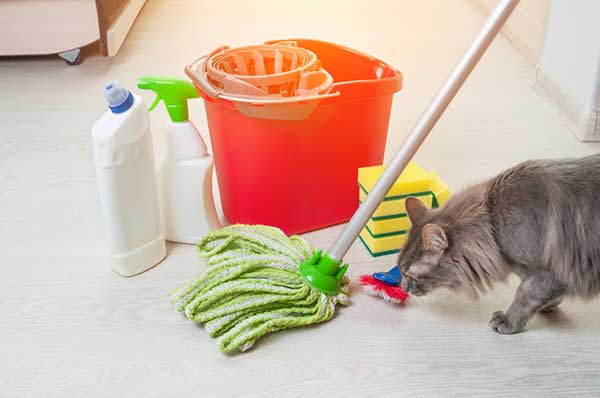
When the global pandemic hit, many people became more vigilant about keeping their homes and workplaces clean to prevent the spread of the COVID-19 virus.

However, in doing so, they may have unintentionally exposed their pets to cleaning products.
While these products are generally safe for humans, dogs and cats may respond differently to the chemicals.
Pet exposure to large doses of common cleaning agents can result in serious issues such as vomiting, hypersalivation, abdominal pain, incoordination, and seizures.
As a responsible pet owner, it’s essential to keep yourself informed about the potential danger of the household cleaners you use and the best way to keep your pets safe while maintaining a clean space.
Toxic Ingredients for Pets
You might be unaware that the cleaning agents you are using have ingredients that can be toxic for your pets.
If your pets’ skin, eyes, or paw pads get in contact with these products, it can result in corrosive wounds, chemical blisters, rashes, and burns.
To prevent any serious injury, learn more about the different substances.
1. Isopropyl alcohol
Also often called rubbing alcohol and isopropanol, this can be poisonous to pets. It can cause vomiting, incoordination, disorientation, and severe issues like seizures and respiratory depression.
For small and young pets, ingesting rubbing alcohol can lower blood pressure, cause difficulty in breathing, and slow down the heart rate.
It would help if you also didn’t use isopropyl alcohol on your pets’ skin because it can cause damage.
In addition, store isopropyl alcohol away from your pets’ reach to avoid accidental ingestion that can lead to alcohol poisoning.
So, while this may be a product you regularly use, be cautious about the dangers of drinking rubbing alcohol for your pets.
2. Bleach
This is a standard household product used for cleaning and disinfecting. It can have severe effects on dogs and cats, depending on the amount of bleach they are exposed to and their exposed manner.
If they walk through a puddle of bleach on the floor, your pet’s skin can get irritated, or their fur can be damaged.
Rinse your pets’ feet immediately and thoroughly to remove any bleach trapped in the toe webs or between the footpads.
Also, skin contact can often lead to ingestions because animals will self-groom and lick the bleach. When this happens, it can result in vomiting, inappetence, and stomach irritation.
Depending on how much bleach they ingested, they may need veterinary treatment. If bleach gets in the eye, this is an emergency situation both for people and pets.
Keep in mind to take extra precautions when handling concentrated or ultra bleaches as they can be corrosive and cause chemical burns.
Don’t mix bleach with other chemicals like ammonia, because this can produce toxic chloramine gas—which can harm the lungs.
3. Hydrogen Peroxide
When your pets’ skin or paws gets exposed to hydrogen peroxide, it can cause skin irritation and rashes.
The common three percent household strength concentration is often used to induce vomiting for dogs, but you should only do this for specific cases and under the direction of a veterinarian.
Do not use hydrogen peroxide on cats to induce vomiting, as a result, can be fatal. If consumed, cats can have severe bleeding and inflammation in the stomach and esophagus.
4. Phenols
Many household cleaning products contain phenols, like disinfectant sprays and toilet bowl cleaners.
Such products can be corrosive if they get in contact with your pets’ skin or eyes, as well as if swallowed. They can also cause injury to the lungs when inhaled.
5. Ammonia
Often listed as quaternary ammonium compounds, this chemical can be found in some disinfecting wipes and sprays.
It can cause corrosive injury to any tissue it contacts and can act as a local irritant. Cats are very sensitive to this chemical, even in small doses.
Higher concentrations can irritate your pet’s lungs and throats, possibly leading to airway inflammation.
Cleaning Safely
To keep your pets safe while you are cleaning, secure them in another room.
You can also keep them crated when you are mopping the floors, so you can avoid accidental exposure.
Properly discard paper towels soaked in disinfectants and sanitizing wipes in covered garbage bins. When cleaning the bathroom, make sure to keep the windows open for proper ventilation.
As an alternative, you can use plant or water-based cleaning products.
You can also use natural common household items like baking soda, vinegar, and lemon juice to clean various surfaces.
But if you will use products containing some of the ingredients previously mentioned, keep them in a secure place where your pets won’t reach them.
Keeping your environment clean and free from germs is very important, especially when you want to stay away from viruses like COVID-19.
But as you disinfect your home and workspace, you may also be exposing your pets to substances that can injure them.
This is why you need to get yourself acquainted with the toxic chemicals found in household cleaning products and take the necessary precautions when using them.
If you suspect your pet ingested a harmful chemical, consult a veterinarian immediately.


